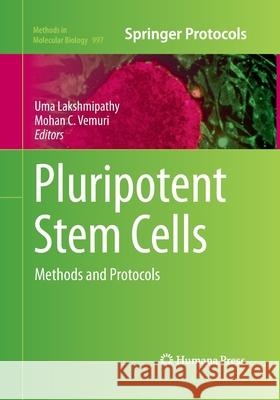Pluripotent Stem Cells: Methods and Protocols » książka



Pluripotent Stem Cells: Methods and Protocols
ISBN-13: 9781493962853 / Angielski / Miękka / 2016 / 292 str.
Pluripotent Stem Cells: Methods and Protocols
ISBN-13: 9781493962853 / Angielski / Miękka / 2016 / 292 str.
(netto: 536,72 VAT: 5%)
Najniższa cena z 30 dni: 539,74
ok. 22 dni roboczych.
Darmowa dostawa!
This Methods in Molecular Biology(TM) book discusses iPSC production from diverse somatic sources, commonly used characterization methods and the potential application of labeled stem cells with specific methods for cloning, gene delivery and cell engineering.
From the reviews:
"This book is a collection of methods and protocols for the successful generation and characterization of pluripotent stem cells. ... It will be helpful to researchers, lab technicians, and students interested in creating pluripotent cells and their commitment to specific cell lineages. ... The combination of approachable methods and extremely detailed protocols make this a comprehensive guide for anyone interested in this specific field of research. ... the figures, tables, and diagrams clarify the text and make the protocols easy to understand." (Michele Fornaro, Doody's Book Reviews, November, 2013)
"It is particularly wellcome a book devoted to the basic of the pluripotent stem cells ... . All of the chapters are of great value and help in the every day lab working of the stem cell byologist, no doubt ... ." (CarloAlberto Redi, European Journal of Histochemistry, Vol. 57, 2013)Part I. Generation of Pluripotent Stem Cells
1. Sources and Derivation of Human Embryonic Stem Cells
Michal Amit
2. A New Chemical Approach to the Efficient Generation of Mouse Embryonic Stem Cells
Hossein Baharvand and Seyedeh-Nafiseh Hassani
3. A Review of the Methods for Human iPSC Derivation
Nasir Malik and Mahendra S. Rao
4. Generation of Human Induced Pluripotent Stem Cells by Lentiviral Transduction
Jennifer C. Moore
5. Generation of Induced Pluripotent Stem Cells with CytoTune, a Non-Integrating Sendai Virus
Pauline T. Lieu, Andrew Fontes, Mohan C. Vemuri, and Chad C. MacArthur
6. Generation of Human Induced Pluripotent Stem Cells (hiPSCs) using Episomal Vectors on Defined Essential 8TM Medium Conditions
Andrew Fontes, Chad C. MacArthur, Pauline T. Lieu, and Mohan C. Vemuri
7. Feeder-free Substrates for Pluripotent Stem Cell Culture
Alexandria Sams and Mark J. Powers
Part II. Culture and Differentiation of Pluripotent Stem Cells
8. Methods for Culturing Human Embryonic Stem Cells on Feeders
Jasmeet Kaur and Mary Lynn Tilkins
9. Methods for Culturing Human Embryonic Stem Cells in a Xeno-Free System
Jasmeet Kaur, Mary Lynn Tilkins, and Shayne Boucher
10. Directed Differentiation of Human Pluripotent Stem Cells Along the Pancreatic Endocrine Lineage
Dennis Van Hoof and Muluye E. Liku
11. Directed Differentiation of Pluripotent Stem Cells to Functional Hepatocytes
Philip Roelandt, Jolien Vanhove, and Catherine Verfaillie
12. Highly Efficient Directed Differentiation of Human Induced Pluripotent Stem Cells into Cardiomyocytes
Paul W. Burridge and Elias T. Zambidis
13. Generation of iPSC Lines from Human Normal and Neoplastic Blood Cells Using Episomal Vectors
Kejin Hu and Igor Slukvin
Part III. Pluripotent Stem Cell Characterization
14. Cellular Characterization of Human Pluripotent Stem Cells
Rene H. Quintanilla Jr.
15. TaqMan® OpenArray® High Throughput Transcriptional Analysis of Human Embryonic and Induced Pluripotent Stem Cells
Sunali N. Patel, Yalei Wu, Yun Bao, Ricardo Mancebo, Janice Au-Young, and Elena Grigorenko
16. Epigenome Analysis of Pluripotent Stem Cells
Christopher L. Ricupero, Mavis R. Swerdel, and Ronald P. Hart
17. Single Cell Gene Expression Analysis of Pluripotent Stem Cells
Ronald V. Abruzzese and Richard A. Fekete
18. Profiling Stem Cells Using Quantitative PCR Protein Assays
David Ruff and Pauline Lieu
Part IV. Pluripotent Stem Cell Modification and Applications
19. Labeled Stem Cells as Disease Models and in Drug Discovery
Catharina Ellerström, Raimund Strehl, and Johan Hyllner
20. Cloning Technologies
Andrew Fontes
21. Stable Transfection Using Episomal Vectors to Create Modified Human Embryonic Stem Cells
Yin Liu, Kate Wagner, and Uma Lakshmipathy
22. Site-Specific Integration in Human ESC Using Jump-In™ TI™ Technology
Chad C. MacArthur
Human pluripotent stem cells such as human embryonic stem cells (hESC) and induced pluripotent stem cells (iPSC) with their unique developmental plasticity hold immense potential as cellular models for drug discovery and in regenerative medicine as a source for cell replacement. While hESC are derived from a developing embryo, iPSC are generated with forced expression of key transcription factors to convert adult somatic cells to ESC-like cells, a process termed reprogramming. Using iPSC overcomes ethical issues concerning the use of developing embryos and it can be generated from patient-specific cells for downstream applications. Pluripotent Stem Cells: Methods and Protocols highlights the best methods and systems for the entire work flow. Divided into four convenient sections, topics include a focus on producing iPSC from diverse somatic sources, media systems for expanding ESC and iPSC with detailed protocols for directed differentiation into specific lineages, commonly used cellular and molecular characterization methods, and the potential application of labeled stem cells with specific methods for cloning, gene delivery and cell engineering. Written in the successful Methods in Molecular Biology™ series format, chapters include introductions to their respective topics, lists of the necessary materials and reagents, step-by-step, readily reproducible protocols, and notes on troubleshooting and avoiding known pitfalls.
Authoritative and easily accessible, Pluripotent Stem Cells: Methods and Protocols seeks to serve both professionals and novices with its well-honed methodologies in an effort to further our knowledge of this essential cellular feature.
1997-2026 DolnySlask.com Agencja Internetowa
KrainaKsiazek.PL - Księgarnia Internetowa









